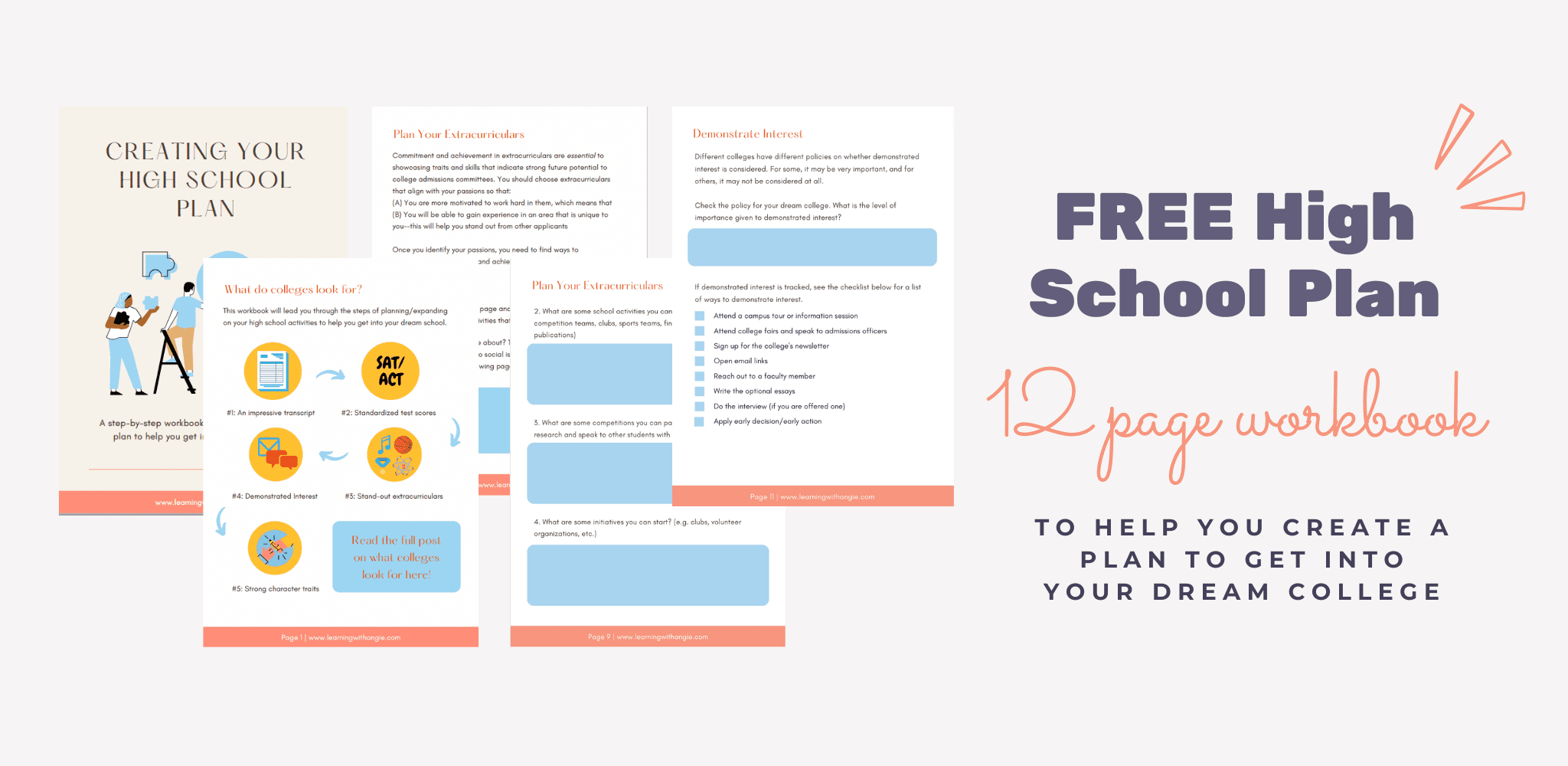

You’ve probably seen headlines containing words like “record-low admissions rate” and “test-optional” during recent college admissions cycles. You’ve probably also browsed forums like r/ApplyingToCollege and College Confidential which often add more stress than clarification. The answer to “What do colleges look for in students?” may seem more confusing than ever.
I was often faced with the same frustrations in high school. However, through trial and error, I learned to distinguish between misleading and beneficial advice. My college application experience and that of my peers also taught me a lot about the dynamics of college admissions.
Quick disclaimer: I don’t claim to be an expert in college admissions by any means. However, the tips in this article helped me and many other students I know to get accepted into their dream schools. I hope that they can help you get accepted into yours.
So what do colleges look for in students? And, more importantly, how do you achieve what they’re looking for?

This is a fairly lengthy article, but that is because I try to cover every crucial component of how to get into your dream college. I also provide detailed steps towards achieving those components. Therefore, I highly suggest that you read it all the way through. By the end, you will have answers to:
- What do colleges look for in transcripts?
- Why is taking the SAT/ACT important, and what score should you aim for?
- What extracurricular activities do colleges look for?
- Why does demonstrated interest in a college matter, and how can you do it?
- What qualities do colleges look for?
#1: What do colleges look for in transcripts?
Colleges use performance in high school as a predictor for future success as a student and beyond. They are looking for students that can make a positive impact on the world.
Having an impressive transcript shows that you are driven, hard-working, and capable. So how can you create a transcript that stands out?
Step 1: Create a Course Plan
Have a clear plan of which classes you will take each year. Make sure you know the credits you need to graduate. Also be aware of honors/AP/IB offerings, and dual enrollment opportunities. In my freshman year, I wrote down all of the classes I planned on taking each year. I followed this schedule, with the exception of only 2 or 3 classes.
Increase the rigor of your course load each year.
Increase the number of higher-level courses you take each year (honors, AP, and/or IB, depending on what your school offers). Doing this shows colleges that you are willing to challenge yourself and strive for growth.

Admissions officers from top-tier colleges, in particular, look for students who take the most rigorous curriculum they can, given the classes offered at their school. If available, they also recommend that students take dual enrollment classes that challenge them.
However, taking the most rigorous curriculum does not mean that you should stuff your schedule with as many AP or IB classes as you can. Instead, you should focus on reaching the highest level in subjects you’re interested in. Thus, when admissions officers look at your transcript, they will quickly recognize your academic interests.
To help you decide which classes to take, make sure to check out this guide on math and science AP classes and this guide on humanities/social sciences and foreign language AP classes.
For example, if you’re interested in physics and your school offers all the AP Physics courses, completing all three AP Physics courses (and doing well in them) demonstrates your passion and ability.
In my case, I knew that I was interested in studying math. Consequently, I planned out my schedule so that I was able to take the highest level math course offered at my school as a senior.
Meet recommended subject studies
Most colleges provide a list of recommended high school courses. Make sure you know what these courses are for the colleges that you’re interested in.

For example, Princeton recommends the following list of courses on their website:
- 4 years of English
- 4 years of math
- 4 years of foreign language
- 2 years of laboratory science
- 2+ years of history
- And “the most rigorous courses possible”
UCLA recommends the following list of courses on their website:
- 2 years history/social science
- 4 years of English
- 4 years of math
- 3 years of laboratory science
- 3 years of foreign language
- 1 year of visual and performing arts
- 1 year of college-preparatory elective
MIT recommends the following list of courses on the MIT Admissions blog (notice how they are much more specific with STEM requirements):
- Math (including calculus)
- 1+ years of physics
- 1+ years of chemistry
- 1+ years of biology
- 4 years of English
- 2 years of foreign language
- 2 years of history/social science
- And “focus on taking the most challenging courses available to you in the areas that most interest you”
Step 2: Maintain a Strong GPA
Research the average GPA of admitted students at your dream school. Aim for a similar GPA. Colleges look for students who will be able to handle their academic rigor, and your GPA is a good predictor of this.
Your GPA is also used to determine your class rank. It’s no secret that top-tier colleges prioritize students who are at the top of their class. According to the Columbia Class of 2025 profile, for example, 95% of admitted students graduated in the top 10% of their class.
Of course, aiming for the top of your class requires a lot of hard work.
In high school, I was able to maintain straight A’s, and if there’s one lesson I’ve learned, it is: don’t take shortcuts.
It’s often tempting to read the SparkNotes version of an assigned book or copy a classmate’s math homework. However, these shortcuts prevent you from actually learning the material.
On the other hand, putting in consistent effort has a long-term payoff. When you study for midterms and finals, you’ll be less stressed because reviewing the material will be easier. Additionally, your teachers will take note of your work ethic. This will enable them to write much better letters of recommendation for you in the future.
You may also like “How to Pass a Class You Hate (How I Went from a B- to A+”
#2: Why is taking the SAT/ACT important, and what score should you aim for?
Sending SAT/ACT scores
Since the COVID-19 pandemic disrupted standardized testing, many colleges have become test optional. However, it is still important to send SAT/ACT scores if you can. These scores enable admissions officers to evaluate your academic ability in the context of the entire applicant pool.
I suggest taking both exams. If you do well on both, it never hurts to submit two outstanding test scores. If you perform better on one than the other, you can just submit the stronger score.

Is my score good enough?
This is a commonly-asked question. It’s important to understand that while standardized test scores are taken into consideration, they are considered in the context of the rest of your application. As such, there is no concrete answer to this question. However, you can have a rough idea of whether your score will enhance or detract from your application.
Most schools publish statistics on the middle 50% score range of accepted students. The closer you are to the 75th percentile of the range, the better. If your score falls below the 50th percentile, it would not help your application to submit it.
According to the MIT Class of 2026 admissions statistics, the middle 50% score range for SAT Math was 790-800, and the middle 50% score range for SAT ERW was 730-780. This means that scoring a 1520 vs. scoring a 1580 does make a difference. One places you at the 25th percentile, and the other places you at the 75th percentile.
How can I improve my score quickly?
This is another commonly-asked question. Although I don’t have the room to post a detailed guide on standardized test-taking strategies here, I do have one major tip for improving your score fast: understand how standardized test-makers think. This one piece of advice helped me significantly when I had limited time to prepare.
Once you realize that standardized tests are created so that only one answer is ever objectively correct, you begin to recognize certain rules that always apply. The same formulas, grammar rules, question types, etc. are ALWAYS used.
For example, in the SAT reading section, it often appears that two answer choices could both be correct. However, in order for an answer to be objectively correct, it needs to be directly stated in the passage.
It is often just one word or two in an answer choice that makes it wrong.
While a wrong answer choice may seem correct based on the general idea of the passage, the exact wording of the answer is never objectively confirmed by the passage.
You may also like “SAT Reading Section Tips That Helped Me Get a 780 On My 1st Try”
#3: What extracurricular activities do colleges look for?
What do colleges look for besides grades and standardized test scores? Commitment and high achievement in extracurriculars are essential in showing that you have strong future potential.
However, the answer to “What activities do colleges look for?” can often be unclear. This section will help you in choosing meaningful extracurriculars.

Step 1: Identify Your Passions
Identifying your passions is crucial in determining which extracurriculars to participate in. You should not participate in random extracurriculars for the sake of participation.
For example, if a student were to participate in Speech and Debate one year, Science Bowl the next, and Yearbook Team after that, it does nothing to show colleges their interests.
Instead, you should dive deep into areas you are passionate about and shape your extracurricular activities around them.
In high school, I was passionate about science and music. I shaped many of my extracurricular activities around these interests and worked hard to achieve the highest caliber I could. This allowed me to demonstrate my persistence, passion, and ability.
Remember: quality, not quantity!
Diving deep into areas you are passionate about will also enable you to bring unique skills that add value to the college community. You will be able to offer talent and expertise that most other applicants cannot.
Imagine this: a student is a skilled violinist. She is concertmaster in a local orchestra, participates in summer music camps, and has won numerous music competitions. She would make a great asset to a college’s fine arts environment.
Imagine that another student is an accomplished creative writer. He writes for the school magazine, participates in writing workshops, and has won Scholastic Awards. He would make great contributions to a college’s publications and English department.
Making impressive extracurricular achievements takes lots of time and effort. However, devoting most of your time to a few primary interests (even just one or two that you excel at) is much more valuable than spreading time across many.
Step 2: Demonstrate Commitment and Achievement
A commonly-asked question regarding extracurriculars is “Do I need flashy awards to stand out?” I believe there are two ways to demonstrate commitment and achievement in extracurriculars: win awards and/or create impact.
Win awards
Awards help admissions officers assess your level of commitment and ability. Therefore, you should actively research competitions relating to your passions. Don’t be afraid to reach high. However, make sure you find resources to set you on the right track for bigger competitions.
For top-tier colleges, there is a common notion that winning national and international awards is the only way to stand out. Although such awards are clearly helpful, they are not necessary to be accepted. This leads me to my second point.
Create impact
Colleges look for students who will be able to make a positive difference in the world. Creating impact on your community through self-initiative and leadership is a great way to demonstrate this. I have listed some examples of creating impact below. However, note that these are just a few—there are many more.

- Make good use of club officer positions. Join clubs that align with your passions, and work towards officer positions.
- Many students are involved in clubs but only participate in existing activities. Instead, use your role as an officer to further the club’s mission in creative ways.
- Organize projects (like donation drives, workshops, lecture series, etc.) that have a tangible impact on your school or larger community.
- Start your own club or nonprofit. If you are passionate about a cause, this is a great way to raise awareness and make a difference.
- There are many wonderful examples of teen-founded organizations online. Take a look at their websites and maybe even reach out for inspiration.
- Starting your own organization requires skills, such as communication and coordination that will make you a distinctive applicant.
- Channel your hobbies in productive ways.
- For example, if your passion is computer programming, you could create an app that provides useful services.
- If your passion is mental health and psychology, you could start a podcast to share mental health tips.
- There are many ways to use your hobbies to make a positive impact—you just need to be open-minded and creative.
Step 3: Take Advantage of Summer Breaks
Pursuing meaningful summer activities is very important, as they demonstrate self-motivation and passion. In addition, summers are a great time to work on more time-consuming projects.
Examples of meaningful activities include internships, camps, and community service initiatives. You will likely have to apply for these activities months in advance, so make sure to start planning early on.
#4: Why does demonstrated interest in a college matter, and how can you do it?
OK, the heading for this section is kind of misleading because many colleges but not all take the level of demonstrated interest into consideration. Therefore, you should look up the policy for schools you’re interested in. Some consider it to be very important and others do not consider it at all. If demonstrated interest is a factor in admissions decisions, you may want to consider some of these strategies:
- Attend a campus tour or information session
- Attend college fairs and speak to admissions officers
- Sign up for the college’s newsletter
- Open email links
- Reach out to a faculty member
- Write the optional essays
- Do the interview (if you are offered one)
- Apply early decision/early action
#5: What qualities do colleges look for?
Colleges look for students who will be a great addition to their community.
Your transcript, standardized test scores, and extracurriculars provide insight into your passions and abilities.
Your essays and recommendation letters provide insight into your personality. Your personality matters a lot to colleges! They want students who will be hard-working and collaborate well with peers and mentors.
Although you likely won’t be starting your essays or letter requests until late junior/early senior year, there are steps you can implement to prepare.
Step 1: Be An Engaged Student

Put in your best effort from day 1. Participating in class discussions and doing consistent work can go a long way in helping you stand out.
Also, don’t be afraid to attend extra help sessions or ask for additional advice. This shows that you genuinely care about expanding upon your learning. Being an engaged student will help you earn strong recommendation letters.
Step 2: Seek Meaningful Experiences
College essays allow you to detail personal experiences that add another dimension to your application. Some things you will be able to write about are:
- your passions
- your motivations and aspirations
- experiences that shaped you
- why you hope to attend a certain college
Dive deep into things you have passion for. I already mentioned this earlier: choose rigorous classes and do meaningful extracurriculars that align with your interests.
If you pursue your passions to the fullest, you will have little trouble in making them shine in your essays.
During the college application process, I had to write several essays on my passions. Because I had devoted so much time to them, I was able to write about them from a unique and personal perspective.
Imagine, for example, that you are passionate about science and participate in a prestigious research program. The experience you gain will give you an insider perspective on science research that most other applicants won’t have.
Step outside of your comfort zone. In many of my college essays, I wrote about experiences in which I faced challenges and overcame them.
I did this because telling these stories enabled me to demonstrate my growth throughout high school, and thus, my potential for growth in the future.
Doing things like assuming leadership roles, participating in bigger competitions, and taking challenging courses were daunting at first. However, taking on these challenges enabled me to grow and accomplish things I hadn’t imagined I could.

Step 3: Begin College Research Early
When admissions officers evaluate applicants, they want to know how they will fit into the college community. Your job as an applicant is to clearly demonstrate that you will be a good fit for the college. In order to do this, begin researching colleges early on. A list of things to look into include:
- Mission statement
- Degree programs
- Professors and classes (as a bonus, take a look at the syllabi)
- Research opportunities
- Clubs and student organizations
- Study abroad programs
- Volunteer opportunities
- Student culture (read some student publications)
- Campus and surrounding community

When the time to apply rolls around, you will have no trouble answering the common “Why us?” essay prompt.
Next Steps
Applying for college can be stressful and confusing, but I hope this article provides you with a clearer answer to the question “What do colleges look for in applicants?”
To help you plan or expand on high school activities that align with your dream college’s standards, please make sure to download my free 12-page Creating Your High School Plan workbook.
Finally, I would like to say that while getting into your dream college is a wonderful accomplishment, you shouldn’t make it your top priority. College is just the first step, and your success later on in life still depends on your own passion and initiative.
While the activities that I did in high school helped me get into my dream school, they also taught me a lot of valuable skills and enabled me to build meaningful connections with others. As you plan out your high school activities, I encourage you to focus on these aspects as well.
If you have any questions, let me know in the comments below or reach out to me via my Contact page!
Also, make sure to check out these related posts:
- Most Impressive AP Classes (+ Useful Tips to Succeed in Them)
- 26 Essential Tips for Freshman Year of High School
- Importance of Student Leadership in High School + Unique Ways to Show Leadership
- SAT Reading Section Tips That Helped Me Get a 780 On My 1st Try
- Failproof Strategies to Answer Alumni Interview Questions

Learning With Angie is a place to share honest, unfiltered advice to promote student success. So if you’re a student (high school, college, or beyond) looking for tips on productivity, studying, personal growth, and more to reach your potential, this is the place! To read more about Learning with Angie, click here.

















